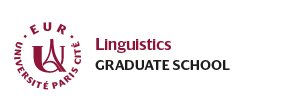Master of Computational Linguistics

Description
The Master’s programme in Computational Linguistics combines theory and practice in natural language processing (NLP). The goal of this curriculum is for students to learn how to design, implement and test NLP systems, going beyond the use of out-of-the-box tools. Our Master is designed to enable students to adapt to a rapidly changing field, both concerning the practical and theoretical aspects, and to interact naturally with data scientists, computer scientists and linguists.
The Master’s programme trains students in language modelling using mathematical and computational methods. They will receive instruction in statistics, machine learning, artificial intelligence and linguistics. The professional orientation leads to positions in companies specialising in natural language processing and data science, mainly oriented towards the processing of written texts. The research orientation can lead to a PhD in computational linguistics.
Organisation
The Master’s programme is organised around three kinds of lectures:
- Lectures in Natural Language Processing (NLP), which introduce, both from the practical and theoretical points of view, the tools and algorithms at the heart of current NLP systems.
- Lectures in Linguistics (shared with students of the Masters in Linguistics), which ensure that the students are aware of and understand the “theoretical” problems they will face when dealing with actual text or speech data.
- Lectures in Computer Science (generally taught by the Computer Science Department of Université Paris Cité) : these lectures aim to ensure that the students have the necessary knowledge to design and implement NLP algorithms.
Prerequisites for application
Due to its multi-disciplinary character, candidates for this Master’s degree can have different profiles: we welcome either students with a main training in linguistics but with knowledge and interest in computer science and mathematics, or students trained in computer science but interested in linguistics and the formal organisation of languages.
Note that while it is possible to enter the Master’s programme with little to no knowledge of linguistics (such students will receive accelerated introductory courses in linguistics in the first semester of the M1 level) but some knowledge in computer science and in mathematics is required:
- In computer science: students are expected to know the basics of practical computer programming, ideally in Python (namely an understanding of variables, control statements, data structures). To give you an idea of the expected level, you will find here the subject of the very first lab session of the Machine Learning for NLP class (the lab session is done over two 2-hour sessions, then completed at home; some indications are given in class). To (self-)assess your ability to follow the lectures, check whether you are able to write a program that, given a directory containing several text files, prints the 5 most frequent words in all of these files.
- In mathematics: it is desirable to have followed an introductory course in statistics and probability and, ideally, to know the basics of linear algebra (vector space, matrix-vector multiplication, dot product, etc.)
- In linguistics: a level test is organised in the first week. Students judged to be too beginner in linguistics are then directed towards accelerated introductory courses in different fields of linguistics.
These prerequisites are not “hard constraints”, and should be interpreted as advice to avoid unfortunate academic orientations. A strong motivation and very good academic record may compensate for missing some of the pre-requisites. Depending on your academic record, you will be invited to an online interview in order to evaluate your skills in computer science and discuss your application.
How to apply
Please look at the dedicated web page
In case you do not meet the prerequisites
Students lacking the mathematical and computer science background required to enter the curriculum at the M1 level should consider joining at the L3 level. The L3 year, taught in French, provides the required training to enter the master.
